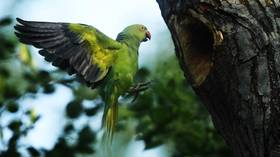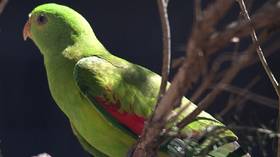Pet parrots declared a threat to endemic birds

Hundreds of pet parrots flee from their owners in New Zealand every year, putting the island nation’s endemic birds, many of which are already endangered species, under a serious threat, a biologist has warned.
An average of 331 parrots escape or are deliberately released into the wild annually in the country, according to Dr. Margaret Stanley, an associate professor in biological studies at the University of Auckland.
The actual figure should be much higher than that as her statistics were only based on the lost birds that are reported by their owner, she added.
But even the conservative numbers are alarming, with simulations run by Stanley revealing a high chance of escaped parrots of the same species meeting in the wild and starting to reproduce.
“We looked at all the details on survivorship and lifespan for these species, and what we found was that for the seven species that we modeled, it was more than an 80% chance that a male-female pair were at large in the same local board area, at any given time,” the biologist told the Guardian.
The number was “even worse” and reached 100% for species like the Indian ring-necked parakeet and the Alexandrine parakeet as they could hybridize with each other, Stanley added.
Parrots might be cute and colorful creatures, but they could become a real menace for New Zealand’s unique birds, 40% of which are already considered endangered.
The uncontrolled breeding of the invasive species will eventually see them competing with local birds for food and nesting space, she explained. The parrots also carry diseases.
New Zealand’s fauna has already suffered immensely over time, thanks to the rabbits, rats, and possums brought into the country in the 19th century. Stanley and her colleagues are eager to prevent the parrots from doing even more damage.
The selling and breeding of several species of these exotic birds, including monk and ringneck parakeets, as well as rainbow lorikeets, will be banned in Auckland from September 1. It’s being done as part of the city’s pest management plan.
But Stanley insisted that it’s not enough: Breeders are already considering moving out of Auckland to go on with their business. The measure “is a little bit toothless if it’s not nationwide,” she argued, calling for parrots to be outlawed everywhere across the country.













